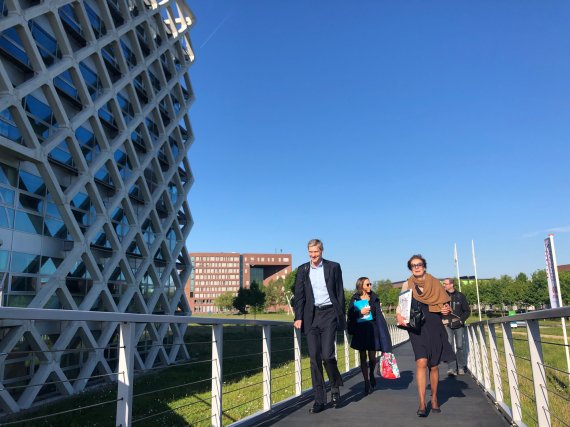Text: Roelof Kleis, Tessa Louwerens, Albert Sikkema

Ivonne Rietjens Professor of Toxicology and on the supervisory board at food company Wessanen
| ‘A board position with a company is something you do primarily for yourself. It brings you into a different setting, it challenges you and you get to see how the industry works. There is no reason to doubt Fresco’s integrity; there will be no question of a conflict of interests. But something can also like a conflict of interests, and you have to be extra careful about that.’ |

Bert Lotz Applied Ecology Team leader at Wageningen Plant Research
| ‘I am proud of our organization and its clear mission. I think we carry out this mission well by doing reliable independent research in strong interaction with society. Our figurehead Louise leads us well in this. I think this board position is a surprising move. Why would the figurehead of WUR forge such a strong link with one particular multinational? That raises all sorts of questions, including questions about your independence. And why Syngenta and not their competitor Bayer, for instance? I think you should steer clear of this, especially as the WUR’s figurehead. We work right across society. I research the possibilities for making agricultural systems more sustainable using, for example, new breeding techniques, and personally I prefer to keep my distance from individual multinationals. That gives me the space to act in relation to government, NGOs, the business world and the public without partiality.’ |

Jeroen Candel Assistant professor of Business Studies
| ‘As a scientist I stand for an open academic debate and I see it as the duty of the board to facilitate that. The credibility of science is already under pressure. So it is extra important to be above reproach and honest and to safeguard your independent status. The board director taking this kind of position means WUR will be identified with a particular position in the public debate. Even if you think you are an independent director, this affects your credibility to the outside world. As director of a university it is not on to accept any additional positions in organizations with private interests, no matter what they are. Then we won’t be taken seriously anymore.’ |

Laurie van Reemst Researcher at Wageningen Environmental Research
| ‘It seems to me that creating the impression of a conflict of interests is harmful, especially in her position. WUR is often accused of being too closely involved in the business world. Look at the discussions about bee deaths, for example, and the relationship with Bayer. For me the question is, what is her real motive? How much money is she paid for this, and how does she intend to use her position as the public face of WUR? How can she keep her roles separate? It would be good to have more openness about this.’ |

Peter Jongebloed Project Manager at Corporate Strategy & Accounts
| ‘I’m a bit ambivalent about it. In itself, it’s a good thing if Fresco works for a company like that as an independent expert, so as to contribute to the transition to more sustainable agriculture and food production. That is typical of WUR, where we don’t stay in our ivory tower but are constantly in dialogue with the various stakeholders in our field. We do that through public-private research projects, through public debate and as advisors. Only through co-creation can you achieve transitions and impact. On the other hand, with this appointment Fresco could create the impression that she has hitched her wagon to a big company. But I am sure she is confident enough to adopt an independent position.’ |

Thom Kuijper Personal professor of Soil Biology
| ‘You can’t combine being chair of the Executive Board of Wageningen University with a position on the supervisory board at Syngenta. And that doesn’t only apply to Syngenta: this would be just as out of order if it was Greenpeace. And that is nothing to do with Louise Fresco’s integrity, which is beyond doubt for me. The point is that you are combining positions that can’t be reconciled. In the academic community there is a lot of discussion about the role of companies such as Syngenta in making agriculture sustainable. That community needs to be certain of the freedom to develop a diverse range of views. A professor of seed breeding could sit on an industrial board because of his or her expertise, but the chair of the Executive Board should not. By the same token, it would be strange if the prime minister Mark Rutte sat on the board of a company, wouldn’t it? I don’t think Fresco should write columns in the newspaper NRC either. She explicitly writes them as chair of the WUR board. If that position is a relevant fact, she shouldn’t be writing those columns. And if it isn’t relevant, she shouldn’t mention it in the newspaper.’ |

Louise Fresco Chair of the Executive Board of Wageningen University & Research
| In Resource on 18 April: ‘It is part of WUR’s aim to ensure our findings and insights benefit influential organizations that are working hard on sustainable solutions for food production. By working together in this way we can make big strides, and that is an urgent necessity.’ In the newspaper Financieele Dagblad on 27 May: ‘It would be wrong if I didn’t dare collaborate with the private sector. Companies need independent thinkers. I have shown that I am one. I am not part of Syngenta. I advise Syngenta (…). I want to make a difference by making the global food supply more sustainable. You need science to do that and Syngenta’s work is science-based.’ |

 Photo: Willem Andrée
Photo: Willem Andrée